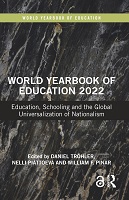Chapter 5 Bringing pedagogy in line
Proposal review
Globalizing nationally programmed instruction, new math, fi lm and media education
Abstract
The first decades after World War II are characterized by an earnest optimism about planning progress and by a fundamental belief in the potential for social and cultural improvement through technical innovation in general and through education in particular. This persuasion manifested itself in the development of tremendous energy sources, numerous technical aids to facilitate daily (house) work, in automation processes of industrial activities and in family planning devices. This attitude did not stop at education, as in the field of learning technologies, where claims were made to make the transfer of knowledge easier and faster, but above all more efficient and secure. These pedagogical innovations were not limited to a nationally framed context, but discussed, exchanged and implemented across national borders even across the Iron Curtain. This worldwide discussion must be seen in its world-political entanglement, since (national) comparisons always imply a certain hierarchy. Against this background, the chapter asks about the “national dimensions” of the various learning technologies and pedagogical innovations, which were per se designed to be globally valid, independent of culture, since they were based on psychological and thus “natural” principles.
Keywords
Daniel Tröhler, Nelli Piattoeva, William F. Pinar, World Yearbook of Education, nationalism, comparative education, history of education, philosophy of education, sociology of education, globalizationDOI
10.4324/9781003137801-8ISBN
9780367684921, 9780367684938, 9781003137801Publisher
Taylor & FrancisPublisher website
https://taylorandfrancis.com/Publication date and place
2022Imprint
RoutledgeClassification
Education


 Download
Download